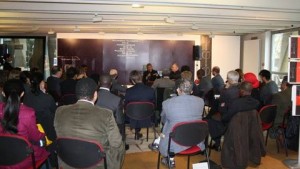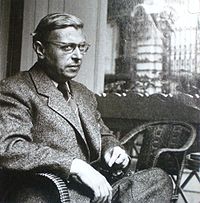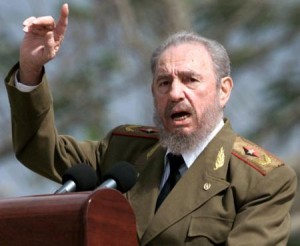‘Philosophy above all else teaches the correct and incorrect use of force’
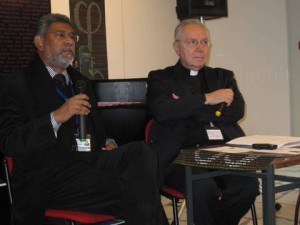
As part of a series of events organized throughout the day at UNESCO Headquarters in Paris on November 17, 2011, the Democracy and Philosophy section of UNESCO, invited Dr Dayan Jayatilleka,(L) Ambassador and Permanent Delegate of Sri Lanka to moderate a discussion at an event designated Café Philo (philosophical café) on the topic of “Political Movements for Change: What Ethics?” and introduce his book “Fidel’s Ethics of Violence” in support of his presentation. Msgr. Francesco Follo,(R) Professor of the History of Philosophy and Permanent Observer of the Vatican to UNESCO, presented a critical response as co-moderator

As part of a series of events organized throughout the day at UNESCO Headquarters in Paris on November 17, 2011, the Democracy and Philosophy section of UNESCO, invited Dr Dayan Jayatilleka,(L) Ambassador and Permanent Delegate of Sri Lanka to moderate a discussion at an event designated Café Philo (philosophical café) on the topic of “Political Movements for Change: What Ethics?” and introduce his book “Fidel’s Ethics of Violence” in support of his presentation. Msgr. Francesco Follo,(R) Professor of the History of Philosophy and Permanent Observer of the Vatican to UNESCO, presented a critical response as co-moderator
The book that I wrote entails reflections on the ethics of violence as part of political transformation. It did not come entirely out of an academic exercise. It came as the result of an attempt to apply ideas and also to reflect on action and the deflection of those ideas by reality. Sri Lanka as you know has been a very violent place and in 1989 when the civil war in El Salvador was at its peak, the prestigious periodical, The Economist (London) referred to Sri Lanka as the bloodiest place in the world.
We in Sri Lanka have experienced all possible forms of political violence except — and this is an important exception — for the replacement of elected civilian government by the military; that has never happened. But we have had an ethnic or secessionist civil war for thirty years and we have had two ultra-left or far left insurrections in the southern part of the country which is dominated by the ethnic majority. The latest Norwegian study of the ethno-secessionist war gives the casualty figure of 80,000 and the casualty figures for the other two insurrections vary. So Sri Lanka has been a crucible to test political ideas; all the ideas were thrown into the vessel: the ideas of national liberation, socialism, self-determination, sovereignty, democracy. As somebody who was an observer- participant or participant-observer and an analyst of the crisis, I could not but help try to squeeze something theoretical, something conceptual, out of it. My reflections were informed by my training of choice as a political scientist, a field which I studied and which I teach. I am not, in that sense, a philosopher, unlike Msgr. Follo. But my reflections as a political scientist have brought me back into political philosophy and therefore also to philosophy itself. That is the background.
Kautilya, also known as Chanakya, the author of the famous Indian book on state-craft, the Arthashastra, a very ancient text, says that “Philosophy above all else teaches the correct and incorrect use of force.” Now force is used either by those who want to preserve the status quo and resist change or those who want to change the status quo. Force in the form of violence, legal or illegal, is sometimes used by those who resist repression; by those who visit repression on others; and by those who seek to transform that which exists in one way or the other- either turn the clock back or push it forward (as they see it). So we cannot escape the ubiquity or force, by which I include violence.
Does this ubiquity mean, do the horrors of violence mean, that philosophically, ethically, the discussion is inexorably polarized along one of two lines? At one end would be a position that is identified (not entirely correctly) as a realist position or a hard-nosed position, or as Henry James would call it, a tough-minded attitude. This attitude runs along the lines of “well if that is what it takes to get it done, whether it is to put down a rebellion or to take a rebellion to success, whatever it takes is necessary, and if it is necessary it is justifiable”. This is one point of view. The latest incarnation of that was the so-called Global War on Terror on one hand, and on the other, 9/11, the methods and modes of struggle of Al Qaeda, the Taliban, and the LTTE (the Liberation Tigers of Tamil Eelam) of Sri Lanka.
At the other point of the spectrum is the philosophical position of absolute non-violence that is associated mostly with Mahatma Gandhi. There is also an intermediate position, a third position, identified perhaps with the ANC, and that is tactical violence; not violence as a strategy for transformation but selective violence as armed propaganda. These are been the positions that are been available in the field.
But sixty years ago, here in this great city of Paris, the most significant debate on the subject took place between two friends whose friendship would not survive the debate. One was a practicing philosopher, the other a writer, respectively Jean-Paul
Sartre and Albert Camus. Though it was not a part of that debate, precisely in that same year, 1951, and precisely here at UNESCO, Jean-Paul Sartre made the point that what we must object to is “unnecessary violence”, not violence as such, and that if one were to oppose violence as such, one really justifies the violence of the capitalist status quo (i.e. what Slavoj Zizek currently terms “structural violence”). Camus for his part made another vital distinction. His conclusion was that violence is justified when it is part of rebellion, but the moment that its objectives are more globally transformational or revolutionary, the moment it shifts from rebellion to revolution, it entails the widening of the scale and scope of violence and leads to its ‘permanentizing’ in the form of a post-revolutionary regime.
In my book, I have attempted to intervene in that debate to say that there is another position that is possible apart from these three. To recapitulate the three positions are, firstly, the ‘absolutising’ of violence or the refusal to entertain ethical considerations in the use of violence; secondly, the Gandhian counter-position in which the moral high ground is permanently occupied because one does not resort to violence whatever and however violent the provocation; thirdly, the intermediate or sub-position of the tactical, as distinct from strategic, use of violence. I have argued that there is a way to transcend the limitations imposed by Camus who maintained that a revolt or rebellion can remain within the bounds of humanism but that if it moves to the more ambitious objective of revolution it then risks and almost certainly entails a brutalizing violence with no ethical bounds.
Having lived through, and in a way participated peripherally in the Sri Lankan turmoil, and having compared and
contrasted the political behavior of the Sri Lankan actors with those in other parts of the world, I have been always brought back to the example of Fidel Castro, Che Guevara, the Cuban revolution and to a certain extent, to the Nicaraguan Sandinista revolution.
Today, when you look at Latin America, what you would find is that those movements for transformation which succeeded are ones which have not transgressed the ethical bounds of humanism. Furthermore, even those movements which failed quite utterly in a military sense, such as the Tupamaros in Uruguay, made a tremendous political come-back because they did not violate humanist ethics or made a subsequent self-criticism of any transgressions from the moral high ground.
The moral high ground is the most valuable of political territory and it is possible to hold this territory even if one has to engage in violence as resistance to repression or as a mode of overall transformation. It is an exception, but it is possible. It is possible because the proof exists in the example, the practice, the consistent practice of Fidel Castro, of Che. They demonstrate that it is possible to be, precisely, revolutionaries, and practice a higher ethics be it as guerillas requesting the assistance of ICRC to tend to captive soldiers, or as a State fighting a counter revolution backed by a gigantic power, or as a doomed guerilla force (Che noted in his Diary that in the course of an ambush he could have shot a Bolivian army soldier who was at the back of a truck but desisted because the soldier looked like he was 14 years old) or as a State engaged in a major war, twelve years in Angola, deploying 300,000 troops from 1976 to 1988 without one accusation of an atrocity even by the United States at the Human Rights Commission in Geneva. So it is possible, while deploying all forms of violence as a State and/or an anti-state movement, to remain within the bounds of ethics and a radical humanism. This has been my point: it has been done and therefore it is possible to do it, and if you do it, it is not only correct ethically, but it is also a key to success and survival.
So in that sense one is able to transform or transcend the divide between realism and idealism because Fidel Castro

Che Guevara said that “if a regime has come into being by electoral means however fraudulent, the outbreak of insurrectional violence cannot be promoted”. But many so called Guevarists, such as the FARC of Colombia and the JVP of Sri Lanka, disregarded this.
remained in power and the revolution has defended itself from all forms of counter-revolutionary projects. This is consonant with Lenin’s notion of power, especially State power. Therefore it has been possible to transcend the divide between realism –where the central question is the retention or acquisition of power- and idealism, where the central question has been that of right or wrong. If one is able to combine the two, then it is possible, whether as human being or as project, to present a different way of being in the world, a way of being that corresponds in the final analysis, to a notion that has been very important to me, the notion of the Hero.
In one sense, what I have tried to do here is to apply or transpose a particular body of thought which derives from and has been best worked out within Christian theology: the theory or theology of Just War. Of all the religions, perhaps for certain specific reasons, it is Christianity that gave rise to this reflection, the grappling with the question. On the one hand you have a religious founder whose message is taken to be the message of peace and love. This will be questioned by the liberation theologians who would say that justice was as important as peace and love, but the ‘Prince of Peace’ is the way Jesus Christ had been described. On the other hand, the very success of Christianity meant that it had captured from below and inherited the Roman Empire or whatever was left of it. For the message of Christianity to be taken forward, the institutions were necessary. The institutions, the State or a transnational system had to be defended, and that brought up the question of violence. There was another factor, namely the Protestant schism and the intra-Christian wars. So, how to deal with the question of violence which seems to be at variance with the founding doctrine? This led to many rich reflections, and we have what is known as the Just War theory. However, Just War theory remains essentially applicable and applied to the behavior of States, because one of the justifications for a Just War is that it is declared by a legitimate authority, and a legitimate authority was thought to be established rulers or States.
This leaves a huge moral and ethical vacuum. What of movements for resistance and rebellion? Is their violence therefore unconstrained? Liberation theology did not address this. Though in general I am in sympathy with liberation theology, and have been from the time I was a teenager, I do think that Cardinal Ratzinger, the present Pope Benedict, was correct when he made a brilliant short critique, in thesis form, I think it was in the 1980s. pointing out that the liberation theologians run the risk of opting for Barabbas. We know that Barabbas was an ultra-nationalist resistance fighter, a terrorist who fought against the Roman Empire. There was a choice and the people instigated or supported by the hierarchy of the religious clergy of that society at that time, opted for Barabbas.
Too often, including in my country, liberation theology has been used merely to say that whenever and wherever there is resistance against the status quo it is ok because it is in a just cause and for justice. Now this is just not good enough, because there has been too much barbarism which has been unleashed, not only by States but by movements that purported to transform societies: Pol Pot in Cambodia, the LTTE and JVP in Sri Lanka, Sendero Luminoso in Peru. I argue that you need to develop the doctrine of Just War in order that movements that purport to be for change apply it themselves, practice it, because it is not good enough to base yourself on the apriori notion that since you are fighting against injustice, your cause is just and therefore whatever you do is right.
Just War theory has two moves or moments: just cause or justice of the war itself (‘jus ad bellum’) and ascertaining (certainly with Thomas Aquinas’ developments) the just use of violence in war (‘jus in bello’). Not only must the war be just and fit certain criteria but you must be just in the way you wage it. Today there is a third, tentative, a not very well developed ‘move’ calling for a ‘just outcome’ or ‘just peace’. This is relevant, for instance, in a place like Sri Lanka, but it has not been theoretically worked out very much.
I think that it is very necessary to have a rigorous notion of just war, and this is especially true for movements and projects of transformation. One of the great strengths of movements that resist the status quo, movements for change, is precisely that they are morally and ethically superior to the conservative, reactionary, or elitist status quo. Now if that is to be true, it must be not only because of a self-proclamation, but demonstrably so in the actual, political and military conduct of such movements. Under what circumstances should they take up arms? There are certain structural pre-conditions. Che Guevara said that “if a regime has come into being by electoral means however fraudulent, the outbreak of insurrectional violence cannot be promoted”. But many so called Guevarists, such as the FARC of Colombia and the JVP of Sri Lanka, disregarded this.
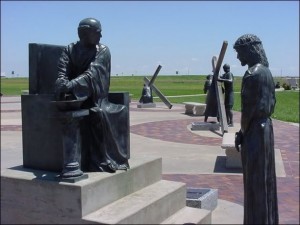
Image of Pontius Pilate washing his hands off Jesus. "I must confess here that my own attitude towards philosophy is somewhat ambivalent. That ambivalence derives from a particular exchange during Christ’s Passion. To me there is a philosophical question which is brought up in the Passion of Jesus Christ, and there is a leap to a post-philosophical position. In the exchange, the only classically philosophical issue that is asked is when Pontius Pilate raises the question: ‘what is truth?’ Significantly the Bible says that Jesus remained silent. To me this is a very important rupture in history of thought because a different personality, a philosopher or teacher of philosophy, would have used the opening for a long disquisition into the nature of truth. But the Gospel says that Jesus remained silent. To me, this is in a way, the ‘end of philosophy’ and the silence of Jesus perhaps points to the next level of philosophy which is the importance of a ‘way of being’. This is what I am trying in my humble way to bring into the conversation, in this book. A way of being, whether it is as a rebel or a revolutionary, whether you are fighting for something you believe in or you try to defend something you believe in. Ethically is it possible to do anything and everything that it takes to achieve an objective, or must we also be conscious of a way of being and of our way of being, in the world?"
There are certain criteria where it is justifiable and certain others where it is not (yet) justifiable to resort to violence. Even if one does resort to violence, how should that violence be practiced? There has to be a code. This is what Christian theology was wrestling with. Violence may be necessary, and if it becomes imperative then it has to be practiced in the right way. Saint Paul said that “it is not true what they say about Christians, that we say that it is permitted to do wrong in the cause of right, so that right may result”. He said that this is not what Christianity is about and I do not think this is what any religion is about, nor do I think it is what any movement for liberation should be about.
If a State crosses the red line of using lethal violence against non violent protests then it undermines its own existence; certainly a regime does. Similarly, if a movement for transformation consciously uses lethal violence against innocents, against the uninvolved, against non combatants, it loses its right to consider itself morally superior and almost inevitably it will lose the struggle it is engaged in.
Msgr. Francesco Follo pointed to the distinctions between ethics and law. I use the Schmitt versus Kelsen debate as a reference point, and my notion of law is perhaps biased by political science. If one believes that law is a superstructure which reflects power relations, then a movement for political change is more likely to respect the notion of ethics rather than the notion of law. So this is why I still take my chances with the ethical rather than the legal.
I must confess here that my own attitude towards philosophy is somewhat ambivalent. That ambivalence derives from a particular exchange during Christ’s Passion. To me there is a philosophical question which is brought up in the Passion of Jesus Christ, and there is a leap to a post-philosophical position. In the exchange, the only classically philosophical issue that is asked is when Pontius Pilate raises the question: ‘what is truth?’ Significantly the Bible says that Jesus remained silent. To me this is a very important rupture in history of thought because a different personality, a philosopher or teacher of philosophy, would have used the opening for a long disquisition into the nature of truth. But the Gospel says that Jesus remained silent. To me, this is in a way, the ‘end of philosophy’ and the silence of Jesus perhaps points to the next level of philosophy which is the importance of a ‘way of being’. This is what I am trying in my humble way to bring into the conversation, in this book. A way of being, whether it is as a rebel or a revolutionary, whether you are fighting for something you believe in or you try to defend something you believe in. Ethically is it possible to do anything and everything that it takes to achieve an objective, or must we also be conscious of a way of being and of our way of being, in the world?
I do not focus on updating the theory of Just War for states because that has been done, particularly in the West by those such as Michael Walzer. What has not happened, where there is a theoretical absence, is in the non-state or anti-systemic space. This is where I have tried to make an intervention.
Is it possible – Nietzsche would say that it is not – to think philosophically in terms other than that of hierarchy? Is not the more important issue what that hierarchy is based on? The crucial question of values was brought up, and here I believe that Nietzsche was correct when he referred repeatedly to the transvaluation of values.
Regarding the debate about universality, I think that a synthesis is possible in this debate. If above all else we are human, then there are certain values deriving from that common, shared, condition of humanity which are universal. But the error that is made is two-fold. On the one hand there are those who deny that there are any kinds of values that are universal and counter-pose ‘Asian values’ or ‘home grown’ values to universality. By doing so, what it really means is that you do not accept the universality of the human condition — that all beings are created or born as equal and equally human, and possess inalienable equal rights. This is one cardinal error. The other is to forget what Lenin called “uneven development”. Mao and Althusser reminded us that absolutely everything develops unevenly. Universality does not manifest itself universally and at the same time! Regis Debray was correct when he said that the historical clock shows different times from Caracas to Paris. I would say that universality is reflected and refracted through the presence of the regional, the local. One may argue in terms of stages of development that certain societies are on the same path but are not at the same point of evolution. Another perspective or a variant is that there are different pathways, different trajectories. Whichever explanation you choose, it is important to understand that the universal acts through the particular.
So the denial of universality is one philosophical and methodological error and the failure to understand uneven development and the dialectic of the universal and the particular, is another. I think we should avoid both. But I remain passionately committed to the notion of universality and universal values which derive from our common human condition. The values of humanism are part of these universal values.
Msgr. Follo evoked Novalis who said that philosophy gives the courage to go on. Martin Heidegger says that the crucial question of philosophy is to find a place to dwell. But in order to find a place to dwell you have to go on. Then again Bob Dylan said there’s “no direction home”. So these are the problems of philosophy, to find the direction home, to find a place to dwell and find the courage to go on.
The above is a presentation by Ambassador Dayan Jayatilleka onUNESCO’s World Philosophy Day
(World Philosophy Day is a UNESCO initiative to make philosophical reflection and spaces for the stimulation of critical thinking and debate, accessible to all. As part of a series of events organized throughout the day at UNESCO Headquarters in Paris on November 17, 2011, the Democracy and Philosophy section of UNESCO, invited Dr Dayan Jayatilleka, Ambassador and Permanent Delegate of Sri Lanka to moderate a discussion at an event designated Café Philo (philosophical café) on the topic of “Political Movements for Change: What Ethics?” and introduce his book “Fidel’s Ethics of Violence” in support of his presentation. Msgr. Francesco Follo, Professor of the History of Philosophy and Permanent Observer of the Vatican to UNESCO, presented a critical response as co-moderator.)
